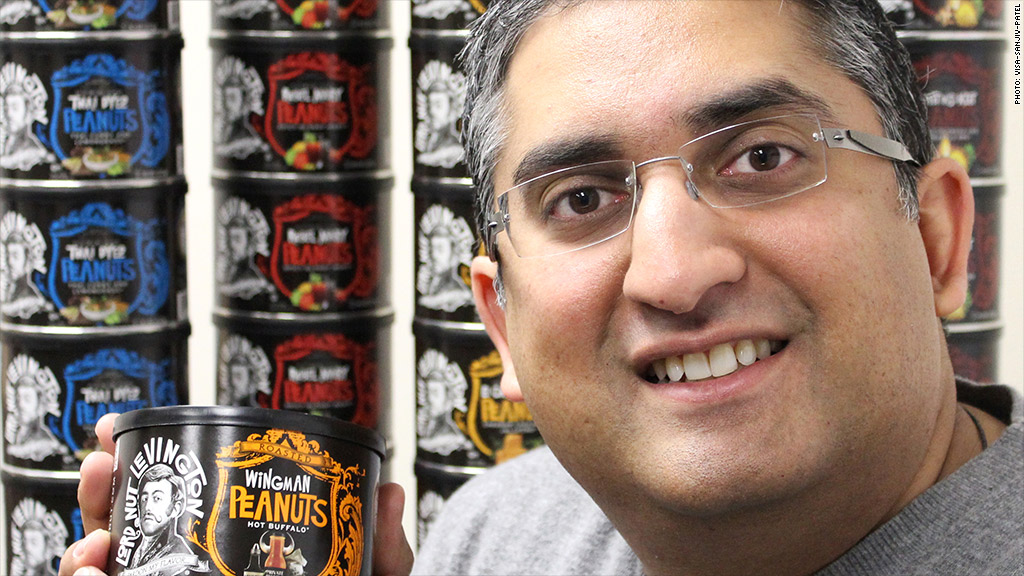
Sanjiv Patel has plowed over $1 million into his peanut company Holy Cow. Last year, he had over $300,000 in sales, his product was in roughly 600 stores, and he had two full-time employees. But if he doesn't hire another eight people in the next 12 months, he could get kicked out of the country.
Patel is here on an investor immigrant visa -- a controversial program that gives a green card to any foreigner who invests at least $500,000 and creates 10 jobs in the United States.
Next March, he'll have to go before immigration officials and prove he's created the 10 positions or he risks losing the temporary green card he was granted last year.
"The worst-case scenario is I leave," said Patel, 40, who's based in Dallas but originally from the UK. "I guess I could always sell the company."
The investor immigrant visa (officially known as EB-5) has been around since 1990 but has expanded rapidly in the last few years. Over 6,600 visas were issued under it in 2012, according to a recent Brookings Institution report. That's up from just 800 in 2007.
Related: Canada kills investor visa popular with Chinese
Its popularity seems to be driven by an increasing number of wealthy foreigners looking to move to the United States, as well as more people promoting the program abroad, according to Brookings.
But despite its popularity, the program has plenty of critics, especially those who see it as a way for the global elite to buy U.S. citizenship.
Even those who support it think there's too much red tape and believe parts of it are mismanaged to the point of fraud.
Much of the criticism is leveled at a separate part of the program that allows investment in regional economic development funds. There, private entities control and invest the money, with the visa applicant often having little idea of where the money goes -- though they still have to prove they've created jobs.
These private entities have been accused of ripping off investors, and both Brookings and an inspector general's report from the Department of Homeland Security, which oversees the program, recommend substantial management changes.
Most program participants choose this passive investment method, but not Patel.
"I'd have to trust my money to strangers and hope for a return," he said. Instead, he decided to start his own company.
Related: 3,000 Americans ditch their passports
The snack business wasn't new to Patel. After graduating from Babson's MBA program in 2002, he got a job at Stacy's -- then an upstart Boston snack maker. Four years later, Stacy's was bought by Frito Lay for an undisclosed amount. As CFO, Patel paid over a million dollars in taxes that year.
But without a job, Patel couldn't stay in the country.
"There's no visa to just stay in the United States and spend money," he said. So he went back to his native England, where he stayed for four years.
But he quickly realized he wanted to return to the United States.
In 2008, he attended a trade fair in Chicago where food makers were looking for marketers to sell their product. He considered fragrances and powdered drinks before settling on peanuts.
"I thought the category was kind of sleepy," he said. "There wasn't really a strong, fun, branded presence."
In 2011 he launched his brand -- Lord Nut Levington, which has six kinds of flavored peanuts that are sold in major U.S. supermarkets. This April, he'll be featured on ABC's show "Shark Tank."

He has two full-time employees -- an accountant and a marketing chief. Together, they handle product development, marketing and the finances. Everything else -- manufacturing, sales, etc. -- is handled by outside firms.
But Patel is frustrated with the investor visa program. There doesn't appear to be any leeway with his March 2015 deadline to create eight more jobs. And while the government does take indirect jobs into account, there's no way to measure that in advance. And it does not distinguish between minimum wage jobs and his two professional-level positions.
He may hire more people just to meet the requirement, but that would be a burden on his company -- which has yet to turn a profit.
"Maybe I should have opened a cleaning business," he said.



